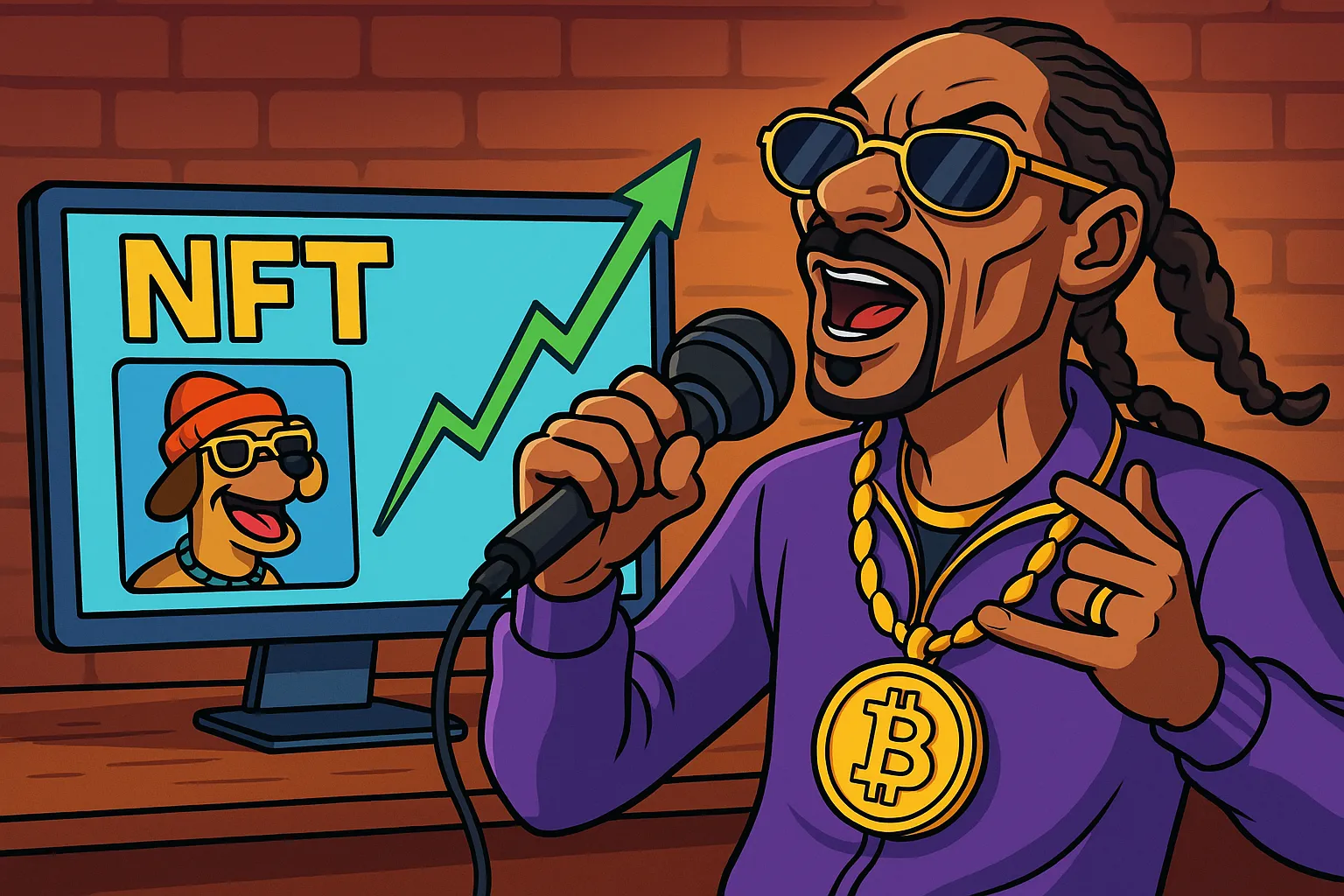Robinhood faces a Florida investigation over claims of misleading crypto fee promotions and unfair trading practices
Bitcoin hits record $118K, Snoop’s NFTs pull $12M
Also: Japan tokenizes real estate, Robinhood faces a Florida probe over fees, and Binance burns $1B in BNB supply

Today’s headlines
Bitcoin smashes $118,783 all-time high
Snoop Dogg NFTs sell out, raise $12M
HSBC completes e-HKD trials in Hong Kong
China explores yuan-backed stablecoins
Japan’s GATES Inc. tokenizes Tokyo real estate
Germany issues €100M blockchain bond
Germany’s Bitcoin sell-off sparks debate
Robinhood faces Florida crypto probe
Coinbase partners with Perplexity AI
Bybit launches #IMakeIt rebrand
US Senate proposes El Salvador sanctions
Binance burns $1B in BNB
The Crypto Radio LIVE has just launched across platforms, bringing you the hottest topics of the day wherever you are. Tune in weekdays at 1pm GST – Dubai time – for daily news in a brand new format.
Below is a breakdown of everything we covered today – Friday July 11, 2025 – from Japan to U.S. and all-time highs to Snoop Dogg. Make sure you tune in again tomorrow on YouTube and X to catch the news as it happens.
Bitcoin hits $118,000, igniting market-wide rally
Bitcoin surged past multiple all-time highs in the past 24 hours, peaking at $118,783.94 before pulling back to hover around $117,600. The rally fueled a 54% surge in daily trading volume to $222 billion, while the global crypto market cap swelled by over $200 billion to nearly $3.7 trillion. Ethereum joined the surge, crossing the $3,000 mark with an 8% daily gain.
Institutional flows into Bitcoin spot ETFs now top $50 billion, adding to the momentum. Meanwhile, over $1 billion in short liquidations provided extra lift, as traders rushed to cover bearish positions. Analysts say this isn’t just a speculative run – it’s a sign that crypto is maturing into a mainstream financial asset class.
Snoop Dogg’s NFTs rake in $12M in half an hour

Finally, Snoop Dogg’s latest NFT collection sold out on Telegram in just 30 minutes, pulling in $12 million. The rapper’s success points to a resurgence of interest in celebrity-backed NFTs after a market downturn last year.
Industry watchers say the sale highlights how NFTs are regaining traction as a tool for fan engagement, particularly when paired with familiar names and platforms.
HSBC pilots e-HKD as Hong Kong eyes digital future
In Asia, HSBC completed its most ambitious blockchain experiments yet, testing a digital Hong Kong dollar (e-HKD) under the Hong Kong Monetary Authority’s Project e-HKD+.
The bank ran pilots on public and private blockchains including Ethereum, Arbitrum, and Polygon, focusing on payment, savings, and settlement use cases.
A survey of more than 700 Hong Kong residents revealed mixed sentiment: while privacy concerns loom large, one in three respondents said they would consider using an e-HKD, particularly for digital asset trading, thanks to the perceived safety of a government-backed currency.
HSBC is also leading initiatives in green digital bonds and was the first bank in Hong Kong to launch an on-chain settlement service.
China softens on crypto
Meanwhile, in China, regulators held high-level discussions hinting at a softer stance on digital currencies. For years, China has been cracking down on crypto trading, but with the rise of dollar-linked stablecoins like USDT and USDC, Chinese tech companies are pushing for local yuan-backed alternatives.
Regulators are now exploring policy options for yuan-pegged stablecoins to maintain financial sovereignty and competitiveness. While no formal policy change has been announced, the shift in tone marks China’s most notable pivot since its 2021 ban.
Japan tokenizes real estate

Japan’s GATES Inc. announced plans to tokenize $75 million worth of Tokyo real estate on the Oasys blockchain, aiming to simplify cross-border investment. The company hopes to scale this to $200 billion – about 1% of Japan’s $20.5 trillion property market – and possibly expand into tokenizing cultural assets like media IP.
Oasys, originally a gaming blockchain, is pivoting into real-world assets (RWAs), signaling Japan’s appetite for blending web3 infrastructure with traditional investment sectors. For foreign investors, this could mean smoother access to Japanese assets without the usual legal and language barriers.
Germany launches $100M crypto bond
In Europe, German state lender NRW.BANK issued a €100 million blockchain-based bond on the Polygon network, marking its first fully digital issuance under Germany’s Electronic Securities Act.
Major institutional players like Deutsche Bank, DZ BANK, and DekaBank backed the deal, highlighting growing confidence in blockchain infrastructure for regulated capital markets.
The issuance is seen as a sign that blockchain is no longer just an experimental technology – it’s becoming a core part of how traditional finance (tradfi) operates, promising faster, cheaper, and more transparent investment products.
Germany’s Bitcoin sell-off sparks scrutiny
At the same time, Germany is drawing fire online after selling nearly 50,000 BTC for $2.89 billion – an average price of $57,900 per coin. If the government had held, that stash would now be worth an eye-watering $5.64 billion, according to Arkham Intelligence.
Critics have questioned whether the sell-off was too hasty, especially as institutions globally are racing to accumulate Bitcoin. However, government officials have not commented publicly, and the sales were likely aimed at cashing out seized assets rather than strategic investments.
Robinhood under Florida fire

In the U.S., Florida’s attorney general has opened an investigation into Robinhood, alleging the popular trading app misled users by marketing itself as the cheapest place to trade crypto.
The investigation centers on Robinhood’s use of payment-for-order-flow – a practice where trades are routed through third parties who pay Robinhood for the volume.
Critics say this setup can result in less favorable prices for retail traders, despite the platform’s low-fee image.
Robinhood’s general counsel Lucas Moskowitz has defended the company’s practices, calling its disclosures “best-in-class.” The platform has until the end of July to provide subpoenaed documents.
Coinbase teams up with Perplexity AI
Coinbase has partnered with AI-powered search engine Perplexity to integrate real-time crypto market data into its platform. Perplexity users will soon be able to query crypto prices, trends, and insights directly through the AI interface, drawing on Coinbase’s market feeds.
The move hints at a near future where large language models (LLMs) might not just answer user questions but also assist in managing trades, portfolios, and financial strategies. It’s part of a growing wave of AI–crypto convergence reshaping how users interact with digital assets.
Bybit unveils fresh rebrand
Bybit has unveiled its new global campaign, #IMakeIt, aiming to refresh its visual identity, update its app, and roll out a redesigned website. With over 70 million registered users, Bybit says it wants to make crypto trading more intuitive, open, and empowering for everyone, whether they’re seasoned traders or first-timers.
The rebrand reflects a broader push among exchanges to differentiate themselves in an increasingly competitive global market, where user experience is becoming as important as trading features.
US targets El Salvador’s Bitcoin push

El Salvador faces U.S. Senate sanctions over alleged human rights abuses tied to its ambitious Bitcoin policies. Photo: Unsplash / Esau Fuentes
The U.S. Senate has introduced the El Salvador Accountability Act of 2025, seeking to impose sanctions on President Nayib Bukele and top officials over alleged human rights violations tied to the country’s Bitcoin strategy. The bill claims U.S. citizens’ rights were violated and probes how Bitcoin funds may have been used in corruption schemes.
Bukele has dismissed the allegations, saying U.S. Democrats are “just salty” about El Salvador’s independent financial policies. The bill raises fresh questions about how national Bitcoin adoption intersects with geopolitics.
Binance burns $1B in BNB, cutting supply
Binance has completed its 32nd token burn, permanently removing about $1 billion worth of BNB from circulation. The event reduces the total circulating supply to roughly 139 million tokens, bringing Binance closer to its long-term goal of halving BNB’s original 200 million supply.
For holders, fewer tokens in circulation can increase scarcity and, potentially, price – though past burns haven’t always delivered immediate market boosts.




